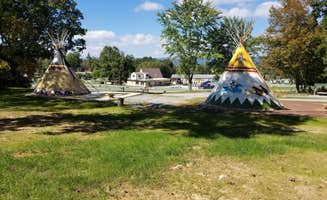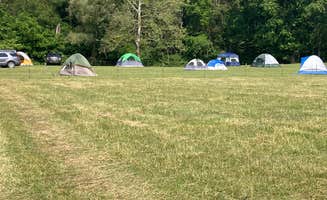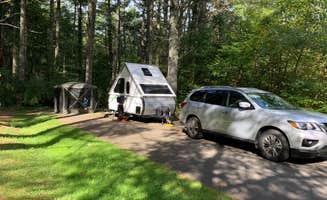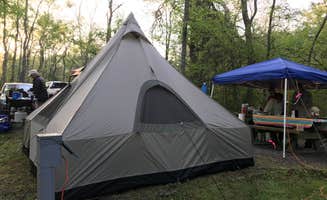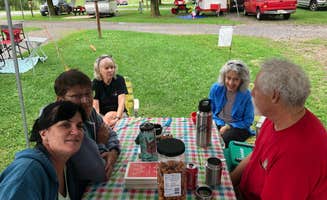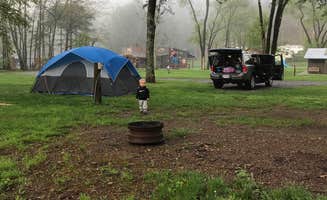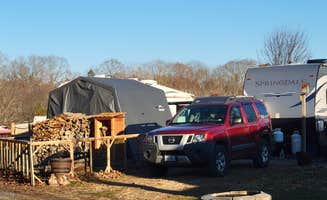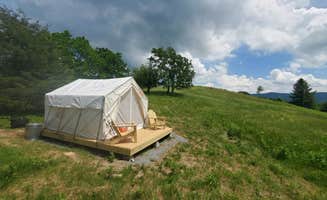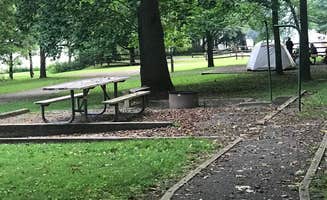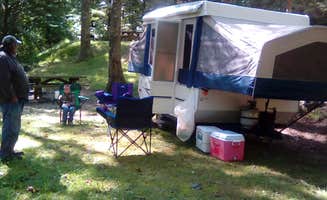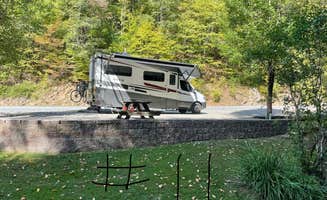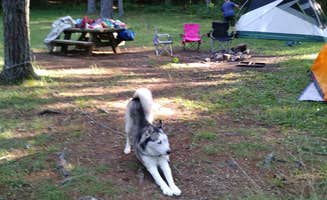Dispersed camping opportunities near Wytheville, Virginia extend beyond established campgrounds into the surrounding Jefferson National Forest. The area sits at elevations ranging from 2,300 to 3,800 feet, creating temperature variations that can be 10-15°F cooler in higher areas. These forested lands offer primitive camping options where campers must pack in supplies and follow Leave No Trace principles.
What to do
Kayaking at Foster Falls: Located at New River Trail State Park, paddlers can explore the New River system. "Really cool campground located right on the New River... The river sounds amazing at night," notes a visitor who appreciated the riverside camping experience.
Bird watching at Fort Chiswell: The rural setting provides habitat for various bird species. A camper at Fort Chiswell RV Park reported, "You are surrounded by farm land on two sides and it was relaxing watching the cows and sheep graze on the hillsides. There's a large pond stocked with koi fish."
Creek exploration for children: Multiple sites feature accessible streams for wading. At Deer Trail Park & Campground, a guest described it as having "a quaint little family owned park... with a a babbling brook that the kids can wade in."
Mountain biking on forest trails: The region offers trails of varying difficulties within short driving distances of most campgrounds. Trails range from beginner-friendly rail-trails to more technical single-track routes through the mountains.
What campers like
Natural water features: Creeks run through several campgrounds, providing both scenic value and recreational opportunities. At Stony Fork Campground, a visitor shared, "The sites are spaced perfectly, the forest is beautiful, and the creek is super clear and clean...right by the trail and creek."
Quiet forest settings: Many sites offer peaceful surroundings despite proximity to major routes. One camper at Pioneer Village noted, "The best thing about this park was all the space we had to walk our dog and the creek that runs at the edge of the property...lots of green space and a even few benches to sit and relax on your walk."
Wildlife viewing opportunities: The natural settings attract various animals. "We saw several deer, some turkey but no bears. Still be aware of your surroundings when moving around and in the campground," advised one camper at Grayson Highlands State Park.
Fishing access: Multiple locations offer catch-and-release fishing in stocked ponds or natural streams. Some private campgrounds don't require state fishing licenses for their on-site ponds.
What you should know
Limited cell service: Many forest and mountain locations have poor or no connectivity. A visitor to Deer Trail Park & Campground explained, "Because of its remote location cell service is all but non existant and Wifi is spotty, but when your enjoying God's handywork who needs electronics?"
Weather variability: Mountain locations experience rapid changes in conditions. Pack layers regardless of season, as evening temperatures can drop significantly even in summer months.
Reservation requirements: Most established campgrounds fill quickly during peak seasons. "I was there the first day the campground opened and it filled quickly. You'll definitely want reservations for a weekend stay," advised a visitor to Hickory Ridge Campground.
Road conditions: Access roads to some forest service sites can be challenging after rain. Four-wheel drive vehicles may be necessary for reaching remote dispersed camping areas, especially during wet conditions.
Tips for camping with families
Playgrounds and recreation: Several campgrounds offer dedicated children's areas. At Wytheville KOA, a visitor praised, "Very clean campground. Has nice pool with waterside and game room with bowling and food and much more. The owners are the best people as well."
Educational opportunities: Historical sites provide learning experiences. "Take advantage of the historic Wrythesville walking tour, you can get information about this in the office and it is WELL WORTH IT!!" recommended a camper staying at Fort Chiswell RV Park.
Water play options: Creeks and ponds offer natural alternatives to pools. A visitor to Stony Fork Campground shared, "The whole place is paved so it was great for scooters. It's a 3/4 mile loop around the campground."
Weather preparation: Mountain conditions can change rapidly, requiring appropriate clothing and gear. Pack extra layers even in summer, as evening temperatures typically drop into the 50s even when daytime highs reach the 80s.
Tips from RVers
Site selection for larger rigs: Not all campgrounds accommodate big rigs. At Hickory Ridge Campground, a visitor noted, "Nice wooded, mostly private campsites. Smaller campground with less than 50 sites I believe...Good sized pull in/back in sites for large RVs."
Hookup locations: Water spigot placement varies significantly between sites. One RVer at Pioneer Village warned, "Our water spigot was way at the back of our site but luckily, I was able to reach it with our 50' hose. The sewer was placed in the middle which was convenient."
Leveling challenges: Many mountain campgrounds have uneven sites. "Needed one inch block on one side to level off...But it is a hilly location. The access road in and out of the campground is a hill," reported a visitor to Pioneer Village.
Dump station access: Not all sites offer full hookups. Plan ahead for waste disposal, as some locations only provide dump stations at main entrances rather than at individual sites.


